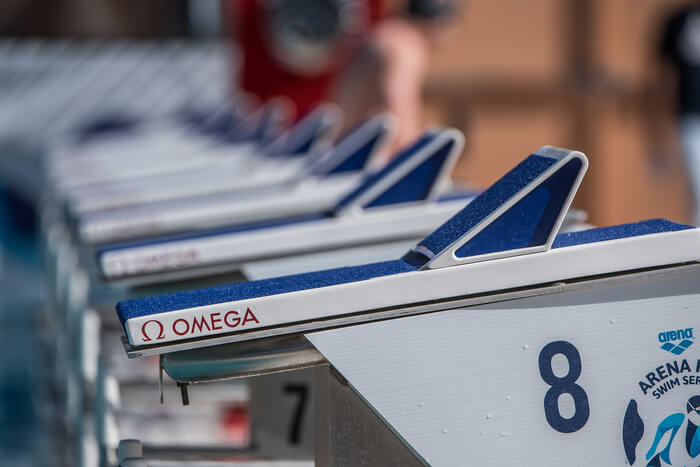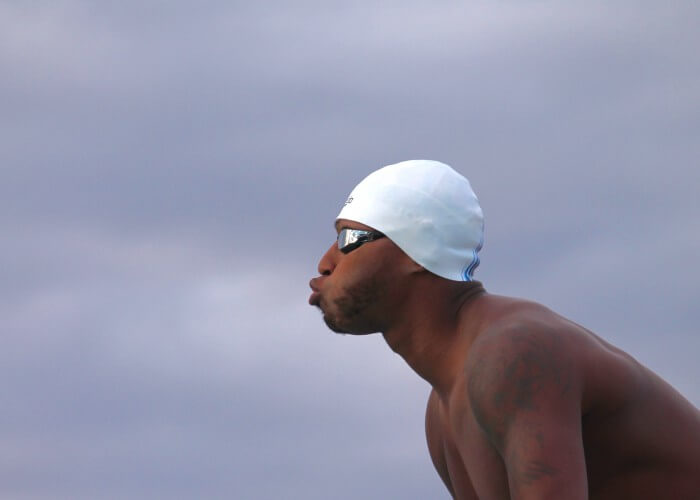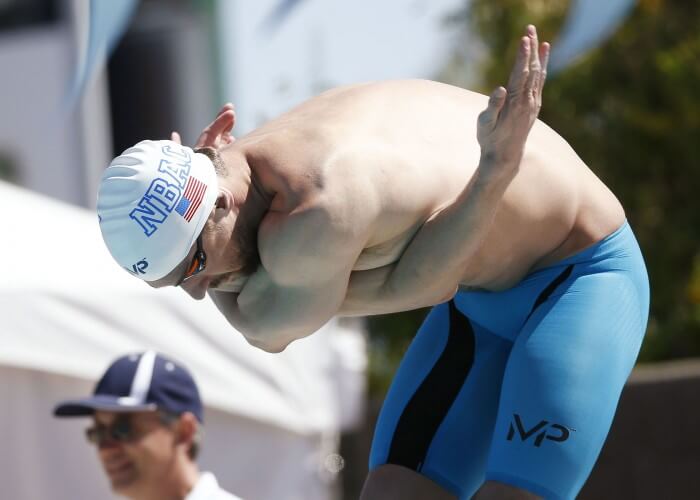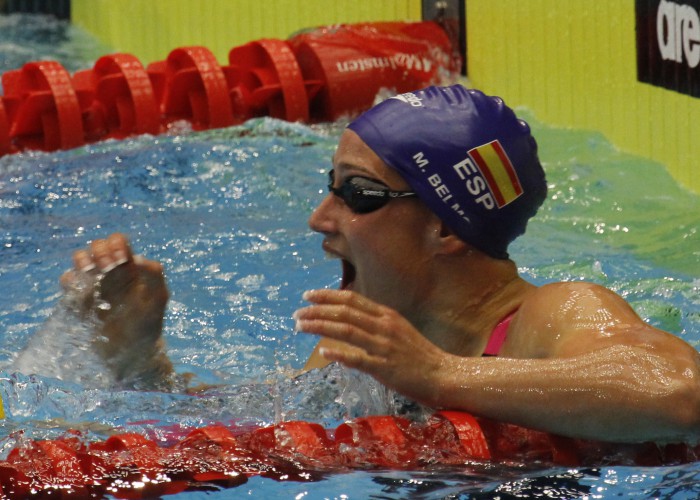How to Embrace Your Pre-Race Nerves and Use Them to Your Advantage

By Taylor Covington, Swimming World College Intern.
It’s typically deemed unpleasant–the churning sensation in your stomach accompanied by the slippery glaze across your palms and forehead–when the body starts to edge out the brain in assuming an organic and fascinating state of hypersensitivity. Each deep breath imparts a sort of rhythm to the hurried patter of your heart, with every anticipatory beat evoking some blend of terror and thrill. The crowd is but a twinkling blur; yet, everything else appears with striking clarity. It’s as if you can see every fat water droplet roll off the edge of the block, hear every jump and shoulder slap in the direction of your competitor’s adjacent lane. There’s the static crackling through the speaker as the starter prepares to announce the event, and the world suddenly narrows to a sole 25-yard lane expanding before you.

Photo Courtesy: Peter H. Bick
Why would we ever aim to tame and dull a brutally beautiful experience such as this? Don’t cope with pre-race anxiety: revel in it.
Here are four ways to embrace your pre-race nerves and use them to your advantage:
1. Trust biology.

Photo Courtesy: Pixabay
Because science. Nature’s design is hardly fallible, and nervousness is your body’s natural method of preparation. Feeling jittery before a race indicates that you care about what you’re about to do, so your sympathetic nervous system decides to help you kick things into high gear. View this as a special opportunity to tap into your most superhuman self where you morph into a superior athlete from the one in practice. Behind the blocks, you are not the overworked, red-in-the-face swimmer of the week day, but rather one with an elevated heart rate, widened bronchial passages, dilated pupils, and pulsing with nature’s blend for the unbelievable and incredible: adrenaline. All of these things are your body’s ways of adding to your weeks of purposeful preparation, making everything right and cohesive in this moment. It’s not something to fear: it’s riveting.
2. Embrace the simplicity.

Photo Courtesy: Kara Sekenski
Many swimmers view nervousness as something that they must learn to manage, when they should be approaching it as the crux of the swimming experience. In that moment before a race, all of the work is done. You’ve completed the race you’re about to swim numerous times–perhaps seven or eight rounds of it on a single aerobic day. Today, you just need to be able to do it one time. Those moments before a race are not the agonizing ones. They’re the moments when the world becomes simpler, where in all of our anticipation there’s this underlying sense of serenity. There’s little in the way of strategy that’s not already programmed in the muscle memory–no pace clocks or beat-per-minute counts. It’s a moment when the mind is quiet and the product is the response of your training and preparation, where there is a single goal that supersedes all else, if only for a moment.
3. That being said, save it for the meet.

Photo Courtesy: Arizona Republic-USA TODAY Sports
Nerves are an integral part of the athletic experience, and they themselves are not to be squelched or tamed. What must be controlled (in order to benefit fully from this natural phenomenon) is the duration of such nerves. Meet jitters should be reserved for the meet, not the days and months before. View them similarly to your meet-specific drink or snack, and reserve that intensity for the precise moment it counts. Otherwise, you may find yourself in a vicious and exhausting cycle in which your nervousness becomes the enemy. In that moment, you adopt a crippled mindset and swimming is no longer fun. Make pre-race jitters a part of the meet routine, and focus on the elements within your control when you’re outside the meet environment.
4. Recognize nerves not only as a valuable part of the athletic experience but also the human experience.

Photo Courtesy: Pia Ellegaard Mortensen
Realistically, the moments that define us aren’t always the ones that make us most comfortable. In fact, pre-race nerves emerge from a whole mosaic of sources. On one hand, we are excited and eager for competition. On another, we are reluctant and fearful of failure.
Above all else, we are unsure of the outcome, and that is where the beauty lies. There’s something about diving headfirst into a realm that slightly scares us, confronting a task that’s intimidating while having something at stake. Being nervous, being uncertain of an outcome, and doing the things that most terrify us are the things that make us feel most alive. Learning to feed off of your nervousness as an exhilarating and special experience takes the edge off while preserving the sanctity of each moment that recruits it.
So next time you’re behind the block, take the briefest moment to appreciate the climbing rate of your heartbeat and each tingling burst of adrenaline. Then, forget about it and just let it take you from there.
All commentaries are the opinion of the author and do not necessarily reflect the views of Swimming World Magazine nor its staff.




Hanna Blewett
Makenna Zoesch
Excellent article on something not usually addressed, but extremely critical to success.
Great tips for swimmers who battle with this issue. My 9 year old already has problems with nerves. We are going to review this together.
Here’s an issue I have – when I visualize a race prior to a meet, just the visualization gets my heart pumping and nerves firing. It’s definitely not relaxation visualization! Is this going to help me or stress me? I’m not sure! In any case, it seems to violate your maxim: “Meet jitters should be reserved for the meet, not the days and months before.”
This is a good question! Visualization is a GREAT practice, and I think it’s totally fine to immerse yourself in that experience. Just be sure to set aside time for visualization, and then relax. You just don’t want find yourself stressing about the outcome of your meet constantly leading up to competition because that can exhausting (and no fun). Save it for the meet and simulations/visualizations—short spurts of time. Sounds like you’re doing all the right things (especially reading SW)! 🙂